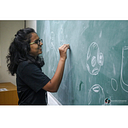Owning up my privilege.
“Why don’t you own your success, Khyati? Why are you trying to be humble with me?!”
I met a friend from school after a long time, we caught up on everything we’ve been doing, and key events from over the years. She casually remarked how she always told her friends about me being the “brainy kid” she expected to be “successful”, and she isn’t surprised about how I am doing now. She said it in a matter-of-fact way. I flushed. I was embarrassed, but more than that I was deeply uncomfortable. I did not like being associated with the term success. What I heard was that I’m being called different and that I’m being put apart from the friends I’ve grown up with.
I did not think, if there’s something worthy of appreciation that I’ve done, it is really mine to flaunt.
Hear me out — Despite coming from a relatively conservative family, my parents have been extremely supportive. They sent me to Goa (the party capital of India) to study, despite resistance. They went against the norms. Since childhood, I was encouraged to participate in school activities, my education was treated with as much importance as my brother’s, if not more. My efforts in school were appreciated, and I was taught to take risks. I was never trained to study just enough to get a good job or to be attractive enough for an NRI. My worth was never tied to my value in the marriage market (yes, it is a market, seriously). When I chose to work at a startup, instead of a comfortable job at a known brand, knowing it would be worse for the evening family time, my dad encouraged me to prioritise career growth. This was not the norm. This still isn’t. My parents took the extra effort to give me the support, that most of my cousins and friends do not have. They actively resisted all the pressure from family and friends.
I have grown up to be the person I am because of this.
Most of my friends and family, like me, are reasonably well to do. We always had enough to meet our needs. While growing up, I never had to worry if my school fees would be paid, or I’ll have the next meal. So when I see someone from a similar or a more luxurious upbringing than that comment how their cook just does not have the “growth mindset”, I feel it comes from deep ignorance of the privileges they’ve enjoyed — the comfort, environment and support they had to be able to prioritise learning.
When my friend asks, “Oh, so you’re the feminist type?” because I protested against a sexist remark, it is also apathy arising from not recognising one’s privileges.
I am deeply grateful for my blessings, and it has only inspired me to do better — put my privilege to good use for someone who hasn’t been as lucky.
Inequality and privilege are complex and layered.
It helps to understand privilege to understand your own journey in life and be kinder to yourself — especially in a world where so much of our self worth is tied to status.
In The GoalKeepers Report 2019, Bill and Melinda Gates Examine Inequality — How geography and gender stack the deck for (or against) you
This is not to point fingers at anyone or belittle anyone’s hard work. However, being aware of the privileges one has enjoyed helps build empathy, feel less entitled and fuel a desire to do better for others.
Just how you’d own up your success, your hard work and adversities, acknowledge the privileges and support you’ve had.
Michael Sandael, explains how meritocracy is a flawed idea, corrosive to the common good — leads to humiliation amongst those who lose out and hubris amongst the winners, has a larger impact on politics and society.
When I was writing this, I was constantly feeling like, what on earth gives a 23-year old girl to talk about privilege and what others should do.
But hey, these are just letters to myself. So that one day I can look back at them and see how far I’ve come.
